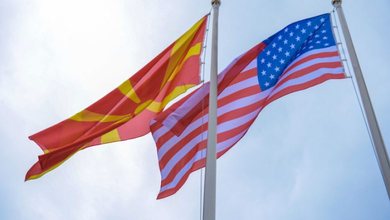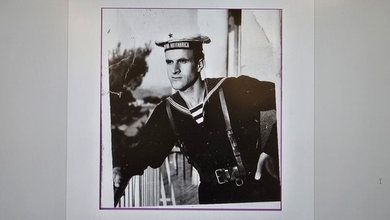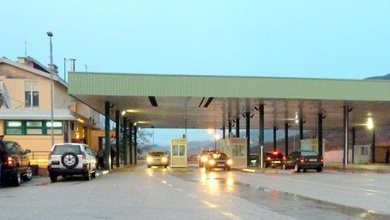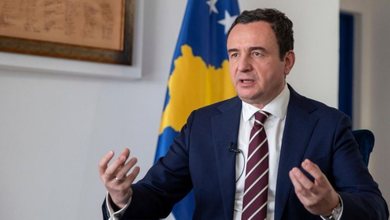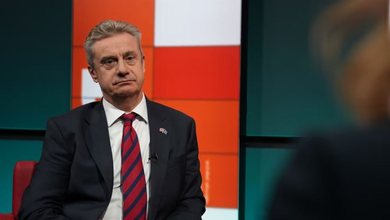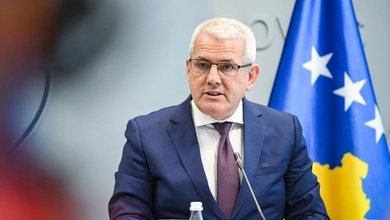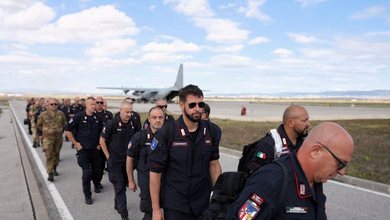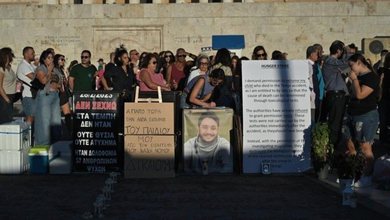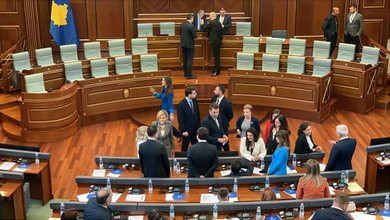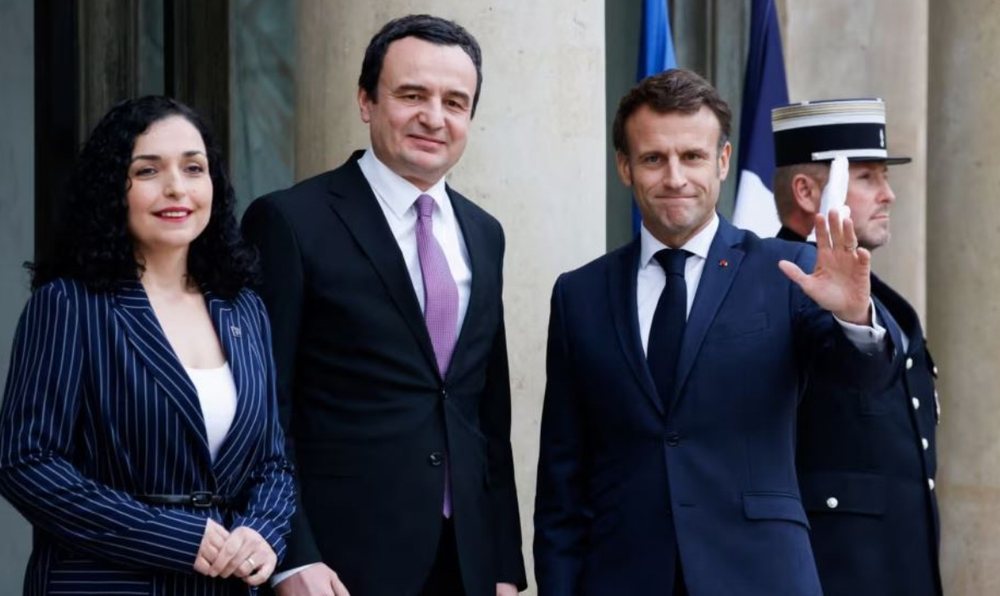
For any country, foreign policy is the main card of influence and security. For Kosovo, this card is being played under difficult conditions: sanctions from the European Union, uncertainty in relations with the United States, and unresolved challenges in the dialogue with Serbia.
As if this were not enough, the situation is further complicated by the apparent lack of coordination between institutions and the ambiguity in defining positions before international partners.
Former diplomat Albert Prenkaj says that Kosovo does not have a foreign policy built on a clear strategy and consolidated alliances. According to him, the country lacks convergence, cooperation and synergy with the US and the EU.
"Kosovo is experiencing asphyxiation, a self-enclosure and has lost relevance in the international arena. There is a total lack of coordination, a cacophony in foreign policy, which, as a result, has brought sanctions," Prenkaj tells Radio Free Europe's Expose program.
For more than two years, Kosovo has been under EU sanctions due to government decisions perceived as unilateral and detrimental to the Serbian community. Most recently, the US has also suspended the launch of the Strategic Dialogue with Kosovo – designed to strengthen bilateral relations – adding to the country’s insecurity and international isolation.
Acting Prime Minister Albin Kurti has acknowledged the existence of some differences with the US, but stressed that Kosovo has not severed relations with it. President Vjosa Osmani, on the other hand, expressed regret for the suspension of the Strategic Dialogue and underlined the importance of maintaining strong ties with the US.
At the end of last month, both of these leaders and the acting head of Kosovo diplomacy, Donika Gërvalla, stayed in the United States while the UN General Assembly was in session, but all three had separate agendas.
From the meetings held, Osmani published photographs with US President Donald Trump and US Secretary of State Marco Rubio.
Gërvalla participated in a forum of female foreign ministers and held separate meetings with counterparts from Albania and Andorra, while Kurti shared footage from meetings with congressmen, students, Albanian-Americans and others.
There have been no reports of any meeting between Kurti or Gërvalla with representatives of the US State Department. Similarly, there have been no joint meetings between Kosovar leaders and leaders of the US or other countries.
According to Article 84 of the Constitution of Kosovo, foreign policy is the competence of the Presidency. However, this responsibility has often caused tensions with the Government.
The two current leaders – Osmani and Kurti – have joined forces on an electoral list in 2021, promising a common political vision.
“We have made an agreement on political principles and goals, which we have just signed in front of you – this agreement for a state with justice and without corruption, for a society with health, employment and education for all citizens, without differences, discrimination and favoritism,” Kurti declared in January 2021.
However, their path has not always been the same. The differences have appeared in relations with allies, in the debate over the Association of Serb-majority Municipalities, over tariffs on US goods and other issues. Sometimes they have been overt, sometimes more indirect.
For Donika Emini, from the European Balkan Policy Advisory Group, these clashes in foreign policy are not new. She recalls the case of former President Hashim Thaçi and former Prime Minister Ramush Haradinaj, when they clashed over the idea of changing the Kosovo-Serbia borders in 2018. According to her, such uncoordinated approaches present Kosovo as an unstable and unserious state in the eyes of the international community.
“For example, the lack of proper coordination at the time when the EU measures were put in place for Kosovo, because there was a six-month period of measures that were not a decision of the [EU] Council and until they were made… for six months they could have coordinated with more proper diplomacy, in order to send clear messages to Brussels… but both Kurti and Osmani neglected this work,” says Emini.
Radio Free Europe has reached out to the Office of the President, the Government and the Ministry of Foreign Affairs to learn about foreign policy priorities and ways of coordinating between them, but has not received any response.
According to Prenkaj, the friction between the leaders is not simply a difference of opinion, but a “fight for ego dominance” that makes it difficult to build a common vision. Emini also sees this as a harmful competition for protagonism.
"We operate with a foreign policy that is formed 'ad hoc', on a daily political basis, for internal consumption and not for external calculations. That is, it is a personal political agenda of certain individuals in Kosovo, it is political calculation and ego," she says.
Prenkaj is convinced that the path to Kosovo's return to the international scene lies in fulfilling the responsibilities assumed in the dialogue on the normalization of relations with Serbia. According to him, Kosovo must show that it is ready to implement the agreements.
"In this case, it is about [establishing] the Association of Serb-majority Municipalities. And then, we can demand the lifting of [EU] measures, the start of the process of membership in the Council of Europe, the recognition of five EU countries in a package, and so on," says the former Kosovo ambassador to Italy.
Prenkaj underlines that foreign policy must represent the interests of all citizens of Kosovo - including the Serbian community. Any conflicting approach towards this community would only deepen the country's isolation, according to him.
Kosovo signed an agreement with Serbia to establish the Association of Serb-majority Municipalities in 2013, but no government has implemented it to date, fearing that it could undermine the functionality of the state.
Pressure from the EU and the US has been ongoing, although it has recently subsided, as a result of international crises and the fact that Kosovo has been operating with a government in office since the February 9 elections.
According to Emini, Kosovo has made a serious omission by not building any sustainable communication channel with the government of German Chancellor Friedrich Merz, considering the key role that Berlin has within the EU. This, she says, has significantly limited the country's opportunities to advance on the European agenda.
The lack of strategy is also noticeable in Washington. Since last year, Kosovo has not had any active lobbying contracts in the United States. The official website of the US Department of Justice’s Foreign Agents Registration Act does not list any such active agreements, unlike Serbia, for example, which has six active lobbying contracts – a clear advantage in the diplomatic race.
To illustrate how a small and limited state should function in the international arena, Emini brings the example of Taiwan. This country, although unsupported by many countries and outside important international organizations due to pressure from China, has managed to build a coherent foreign policy, thanks to functional democracy and close coordination with strategic partners.
Prenkaj also reminds us that states are not measured by rhetoric, but by tangible elements of strength and capacity.
"With the Treaty of Westphalia, which is the basis of diplomacy and international law, states are defined based on four prerogatives: territory, demography, security and economy. Kosovo has all of these, but to a small extent compared to other countries; therefore, in accordance with these prerogatives, it must assume its role in foreign policy and in the international arena," says Prenkaj.
Thus, both experts agree that Kosovo needs a foreign policy that overcomes internal rivalries and puts state interest above personal egos.
In Emin's words, Kosovo must start by fixing its own mistakes and doing its best to lift the EU's punitive measures, which have blocked millions of euros and important meetings. According to her, there are no more protectors to hold Kosovo on its shoulders - all foreign energy is gone. / REL


